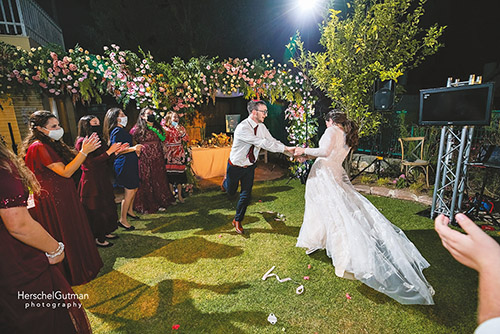


In a normal year, anyone planning a spring simcha would have the details locked in by now. But normal is still in the future. Although the pandemic is inching towards being controlled, event organizers and their clients are grappling with regulations that are changing daily and differ by state and country, making planning a major challenge.
Some couples are now planning weddings that they rescheduled from last spring, and the details are still up in the air. Penny & Co. Events, an event planning firm run by Penny Rabinowitz, formerly of Englewood and now living in Israel, has a client in the U.S. whose wedding was first planned for last May at one venue; rescheduled to August in the same venue; and then for this May, a full year later. “Nobody thought the pandemic would last this long,” said Rabinowitz. But the pandemic is still not over, and the venue’s regulations are causing the couple to think about changing the location.
“The original New York venue this couple planned for their wedding has a more stringent requirement than the state mandates, Rabinowitz continued, “which they feel would inconvenience their guests. As a result, they are searching for an alternate venue. The rules may change by May, but they certainly can’t wait until then to find out.” Fortunately, the couple has all the other vendors re-booked for the new May date, so everyone is on board for the wedding wherever it takes place.
Penny & Co. Events plans and produces weddings in Israel, with a specialty in working with Anglos who want to come to Israel for their wedding, or couples who live in Israel but have family who would have to fly in. Those smachot were cancelled when the airport closed. “Most of our couples postponed their weddings for a few months later, but when they saw the country wasn’t opening up, they got married where they lived, in Europe or America,” she said. “Almost every couple said they will come to Israel when it opens up and have a party, but we’ll see.”
One couple Rabinowitz is working with now switched their date twice due to the lockdown. The new date is rapidly approaching, and they’re still unsure if their guests will be able to fly in. “This is incredibly stressful for couples since their wedding is such a momentous occasion, and without family there to celebrate with them, they don’t feel comfortable setting a date,” said Rabinowitz. “When this happens, my goal is to calm them down and help them recognize that even if their extended families and friends can’t enter the country, there are ways to include them in their wedding using livestream and Zoom.”
People are generally less formal and more spontaneous in Israel, and many of Penny & Co.’s clients moved up weddings to avoid a looming lockdown. “I’ve done a wedding in a day that was supposed to be two weeks later,” she said. “The parents called and said, ‘Let’s do it tomorrow; find out if everyone is available.’ I can’t imagine that happening in America; things are planned much more in advance.”
Sometimes Israelis can be a little too relaxed, Rabinowitz noted, and the authorities have to intervene. In Israel, the police come to every wedding to make sure the rules are being followed. They have shut down weddings and issued fines. Helicopters often fly overhead to detect the number of cell phones in a crowd. The police will be sent in if the number is too high.
Rabinowitz planned a wedding last August for Jodi Fishbein, daughter of popular cookbook author Susie Fishbein of Livingston. The family came to Israel two weeks before the wedding and quarantined in order to attend. Everyone was diligent about following the rules that were in effect at the time, which was during one of the strictest lockdowns. There were 20 people in three adjacent backyards. Everyone was masked and seated two meters apart. When the police showed up during the chuppah ceremony, they saw the rules being followed to the letter and let the wedding continue. “Now venues are opening up, more people are allowed to attend events, but the police continue to enforce the rules,” Rabinowitz said.
The country may be opening, but Rabinowitz said access for tourists is another issue. “The regulations are seemingly changing by the day. Considerations are made based on the relationship to the celebrant. Those who are admitted are subject to quarantine either at their residence with a special tracking bracelet or at a quarantine hotel which isn’t ideal.” She said Israel is working diligently on a globally accepted solution in partnership with other countries.
Rabinowitz continues to work with U.S. clients on events taking place in the States. and finds Zoom to be indispensable. With her knowledge of local vendors from years of planning American events, the process is smooth even during times when she can’t physically be at the events.
Rabinowitz is optimistic that the vaccine will return Israel and the U.S. to normalcy. The number of COVID cases is going down in Israel, and much of the population has either recovered from COVID or been vaccinated. But even when COVID-19 is vanquished, she thinks the trend towards smaller weddings will continue.
“All my brides and grooms are having beautiful and intimate celebrations,” Rabinowitz said. “After every COVID wedding, my couples and their parents say everyone who was at the wedding genuinely wanted to celebrate with them and stayed until the very end. I think people will choose to make smaller weddings and spend more on décor and things that look—and taste—beautiful.”
By Bracha Schwartz









